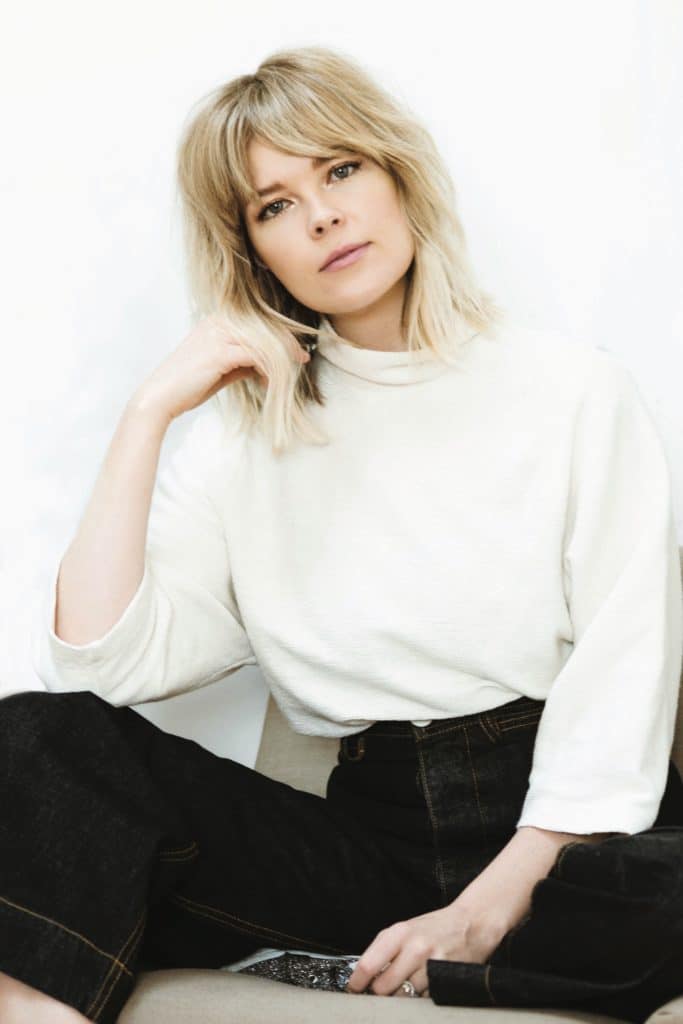We’re thrilled to introduce the 2025 Oregon Literary Fellowship Recipients with individual features on our blog. Out-of-state judges spent several months evaluating the 400+ applications we received, and selected thirteen writers and two publishers to receive grants of $3,500 each. Literary Arts also awarded two Oregon Literary Career Fellowships of $10,000 each. The 2025 Fellowship recipients were recognized at the 2025 Oregon Book Awards Ceremony on April 28, and featured at a public reading event on July 8 at Literary Arts.

Chelsea Bieker (she/her) is a 2025 Oregon Literary Fellow in Fiction and the recipient of the Laurell Swails and Donald Monroe Memorial Fellowship. Chelsea is the author of three books, most recently the national bestselling novel, Madwoman, a Book of the Month club pick the New York Times calls “brilliant in its depiction of the long shadows cast by domestic violence,” and named a best book of the year by NPR, Oprah, Elle, and others. Her first novel, Godshot, was longlisted for The Center For Fiction’s First Novel Prize and named a Barnes & Noble Pick of the Month. Her story collection, Heartbroke, won the California Book Award. She is the co-creator of The Fountain.
Q & A WITH LITERARY ARTS
What excites you the most about receiving an Oregon Literary Fellowship?
The best part of receiving the Fellowship is simply being supported by my home state. I’ve been an Oregonian for fifteen years so it feels special to be honored by a literary institution that means the world to me and so many writers here and that makes Oregon a true literary hub. Beyond that of course, it’s a huge win to me whenever women’s stories of survival are highlighted on a large scale and supported.
How would you describe your writing process or creative practice?
It’s both very intuitive and very intentional. I schedule my writing time like an appointment, or it simply doesn’t happen. I take it very seriously for many reasons but one is that my mental health depends on it. I must write. It’s not a choice for me. But my practice is something I’ve honed over the years and now, in very practical terms consists of three identifiable steps. The first thing is to find a way to drop deep into the subconscious by using guided visualization (I actually make and record my own), then I slide right into writing with zero distractions (no phone allowed!) and then once I’ve written ideally about two hours, I take a break and have a snack or check in with my body and keep going if I want or be done. If I’m done I do a quick reflective journaling practice that records what I wrote that day, what the conditions of the practice were, and where I want to start tomorrow. This process is something I teach on my platform The Fountain and it works like a dream because it totally sidesteps the critic by engaging in deep visualization first and activates all the right creative channels. I never have writer’s block of any kind in terms of getting words on the page. That’s not luck, it’s because of my system. Beyond the system, I can’t offer real explanation for what happens. It’s a spiritual act of channeling and that feels sacred and even private to me. It’s a beautiful communion.
What authors or books have shaped you the most as a writer?
I like writers with style who aren’t afraid to descend to hell and come back again: Kate Braverman, Lisa Taddeo, Elena Ferrante, Natalia Ginzburg to name a few. And then of course the writers who raised me: Toni Morrison, Denis Johnson, Janet Fitch, Dorothy Allison, Michael Cunningham, Charles D’Ambrosio.
Are there any Oregonian writers you look to for motivation or inspiration?
Kimberly King Parsons and Genevieve Hudson are two writers working today that inspire me daily through our living creative friendships. And of course many more. We’re so lucky here. The riches are rich.
What projects, writing or otherwise, are you working on right now?
I’m working on a new novel and maybe another new novel. Sometimes I have two projects going at once which is fun but generally one takes precedence and one becomes a sort of secondary interest that serves me well when I run out of gas with the primary and need a break to let it cook. It’s a great process because usually you end up with two books somehow this way.
Do you have any advice for future applicants?
Keep applying. I applied for this award many times over the years and was rejected. I finally got it now, three published and critically acclaimed books later. It never hurts to throw your hat in the ring is what I say, and sometimes you must be persistent. I would also advise to not get down about it if you don’t win. If you love your work, then that’s what matters. Keep working on what you do best and one day others will get it. But keep writing. Don’t ever stop because someone doesn’t give you an award.
JUDGE’S CITATION
“Chelsea Bieker presents us with a writing sample that must deflect the lurid while recording something sensational, it must avoid shouting while sharing something personal, and it must deepen our understanding of violence. In this novel excerpt, that exact course appears laid out, demonstrating control and craft. It is a harrowing task to take on from any lens, but fiction carries the curse of having to embody perspectives, the knowledge of which only makes this writing sing harder.”
– Scott Gloden

